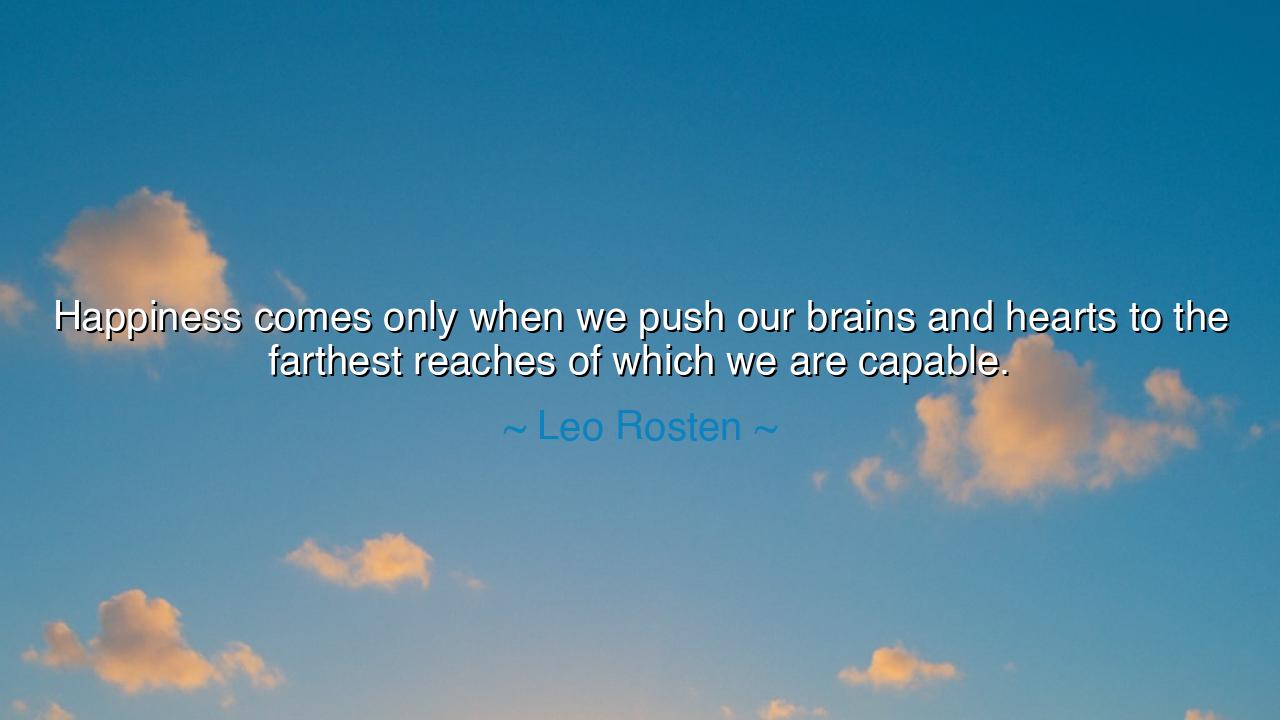
Happiness comes only when we push our brains and hearts to the
Happiness comes only when we push our brains and hearts to the farthest reaches of which we are capable.






In the radiant words of Leo Rosten, a man who devoted his life to understanding the spirit of joy and creativity, we hear a truth that has echoed through all the ages: “Happiness comes only when we push our brains and hearts to the farthest reaches of which we are capable.” This is not the fleeting happiness of comfort, nor the shallow pleasure that fades with time. It is the deep and sacred happiness born of striving — of stretching the mind to think beyond its limits and the heart to love beyond its fear. For Rosten, happiness was not given; it was earned through the full awakening of one’s human potential.
The origin of this saying lies in Rosten’s lifelong observation of people and their pursuits. A scholar, humorist, and philosopher, he saw that true joy never sprang from idleness or ease. Rather, it came from effort — the moment when the mind was fully alive, and the soul fully engaged. He believed that the human spirit is like a flame: if not fed with challenge, it dwindles into apathy. To push our brains and hearts to their farthest reaches, then, is to keep that flame burning bright, to transform existence from mere survival into purposeful living.
Throughout history, those who touched greatness did so not because life was easy, but because they embraced this truth. Think of Leonardo da Vinci, whose endless curiosity led him to study anatomy, painting, engineering, and flight — not for fame, but for wonder. His happiness was not in what he achieved, but in his ceaseless pursuit of mastery. Or of Helen Keller, blind and deaf, who fought through darkness to bring light to others. She once said, “Life is either a daring adventure or nothing.” These lives illustrate what Rosten meant: that the human soul finds its joy only in growth, struggle, and the courage to reach beyond what seems possible.
This quote also reveals a quiet defiance against mediocrity. It warns us that comfort, though tempting, is the slow death of meaning. The man who seeks only ease will never taste the richness of achievement; the woman who fears to fail will never know the thrill of creation. Happiness, Rosten teaches, is not comfort — it is fulfillment, the peace that comes when one has given one’s whole being to a noble endeavor. To live half-heartedly is to live half-alive. To live fully, we must be willing to expend ourselves, to give both mind and heart until we have nothing left untried.
Yet, this pursuit is not only of the intellect, but also of the heart. To push the heart to its farthest reaches means to love boldly, forgive deeply, and care without reserve. It means daring to be vulnerable, to feel the pain and beauty of the world, and still to choose kindness. The heart that loves timidly never knows the glory of compassion; the heart that risks love, even in loss, finds its own quiet form of happiness. Thus, Rosten’s teaching is not a call for ambition alone, but for balance — to cultivate both wisdom and warmth, intellect and empathy, thought and feeling.
We see this balance in the life of Mahatma Gandhi, who united the clarity of mind with the purity of heart. He pushed his intellect to understand the philosophy of nonviolence, and his compassion to suffer for the liberation of others. His happiness was not born from victory or comfort, but from knowing he had given everything to a cause greater than himself. His example reminds us that the fullest happiness is not found in what we gain, but in what we give of ourselves.
So, my child, remember this sacred wisdom: happiness is the fruit of effort. Do not seek a life free of struggle, for struggle is the forge in which the soul is made radiant. Work with your mind until it hungers for truth; love with your heart until it breaks and rebuilds itself stronger. Let no day end with your potential unused, nor your compassion unspoken. For when you have reached the farthest limits of what you can think, do, and love — then, and only then — will you taste the deep and abiding happiness that Leo Rosten spoke of: the joy of a life fully lived.






AAdministratorAdministrator
Welcome, honored guests. Please leave a comment, we will respond soon